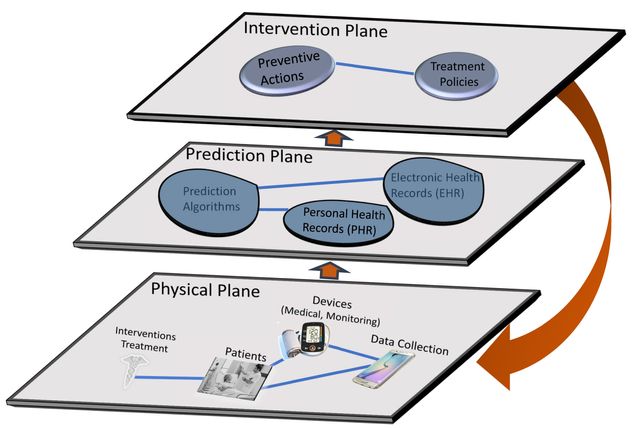QuBBD: From Personalized Predictions to Better Control of Chronic Health Conditions
Funding Agency: National Science Foundation (NSF) and National Institutes of Health (NIH).
Award Number: DMS-1664644.
Principal Investigators: Yannis Paschalidis, Christos Cassandras and Rebecca Mishuris at Boston University.
PROJECT SUMMARY
 Overview. Electronic Health Records (EHRs) and the emerging and richer Personal electronic Health Records (PHRs) offer a great opportunity to develop a systematic approach towards better management of chronic conditions in an outpatient setting and the prevention of hospitalizations required to treat acute episodes resulting from poor control of a patient’s condition. We propose to develop an approach based on novel mathematical methods and the requisite algorithms where EHR and PHR data are first used to develop prediction analytics that anticipate future undesirable events such as hospitalizations, re-admissions, and transitioning to an acute stage of a disease. These predictions trigger personalized interventions, ranging from increased monitoring and doctor visits to optimized treatment policies adapted to each patient. In addition to methodological and algorithmic development, the project proposes to pilot the algorithms to be developed by integrating them into the EHR system of the Boston Medical Center (BMC), a major safety-net hospital.
Overview. Electronic Health Records (EHRs) and the emerging and richer Personal electronic Health Records (PHRs) offer a great opportunity to develop a systematic approach towards better management of chronic conditions in an outpatient setting and the prevention of hospitalizations required to treat acute episodes resulting from poor control of a patient’s condition. We propose to develop an approach based on novel mathematical methods and the requisite algorithms where EHR and PHR data are first used to develop prediction analytics that anticipate future undesirable events such as hospitalizations, re-admissions, and transitioning to an acute stage of a disease. These predictions trigger personalized interventions, ranging from increased monitoring and doctor visits to optimized treatment policies adapted to each patient. In addition to methodological and algorithmic development, the project proposes to pilot the algorithms to be developed by integrating them into the EHR system of the Boston Medical Center (BMC), a major safety-net hospital.
Intellectual Merit. The proposed work targets patients with some of the most common chronic diseases: heart and diabetes. We propose two broad tasks: (i) predictive analytics, and (ii) personalized intervention. Task 1 develops methods for predictions in two time scales, long and medium. These predictions target hospitalizations and rely upon new supervised machine learning approaches that combine classification with clustering as a way of enhancing performance and offering interpretable results. In addition, anomaly detection methods are proposed for shorter term predictions. Task 2 focuses on interventions seeking to prevent events predicted under Task 1. Interventions include increased monitoring and optimizing treatment policies using Markov Decision Processes and perturbation analysis methods. The work will rely on access to EHRs at BMC, additional data involving low-income Medicaid patients, and will utilize publicly available critical care data. Methodological advances in joint clustering and classification, anomaly detection, learning and improving MDP policies, and perturbation analysis techniques have wider applicability. The proposal will fund a new collaboration of mathematical scientists with a physician who is also the Associate Chief Medical Information Officer at BMC.
Broader Impact. The proposed work has the potential to achieve revolutionary improvements in the quality of health care. Predictions coupled with intelligent interventions and control can prevent acute episodes of chronic diseases and dramatically improve health outcomes. If applied widely, the research will certainly impact health care economics by reducing the more than \$ 30 billion annually spent in the U.S. on hospitalizations that could have been prevented. An important feature of the proposed work is that the data we plan to utilize concern a significant percentage of low-income and underrepresented groups, hence, the research can benefit these often overlooked segments of the U.S. population. On the educational front, plans include new courses, training a diverse set of graduate students, involving undergraduate students, actively collaborating with medical doctors, and reaching out to high school students through existing programs embraced by the PIs. Dissemination plans include organizing a major medical informatics workshop which can lead to the creation of an influential interest group in this area of research.
